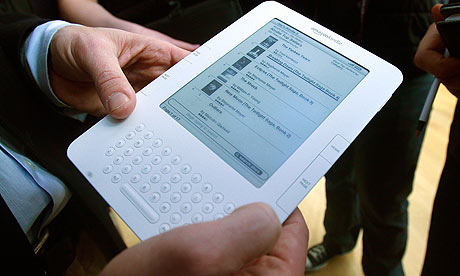
Another blow struck against the robot overlords by the Authors Guild, an advocacy body for American writers best known on these shores for its strong tradition of fighting the future. Past triumphs for the Guild have included suing Google over Google Books and encouraging its members not to link to Amazon because Amazon sells secondhand books: now it's going after Amazon's second-generation ebook reader, the Kindle 2, because the slim, supermodellish machine possesses a function that lets a computerised voice read a text to you through speakers. Or, as the Guild's president, Roy Blount Jr, put it in a New York Times comment piece earlier this week, "Kindle 2 can read books out loud. And Kindle 2 is not paying anyone for audio rights."
The first shot in the Kindle war was fired before the device's release with an extraordinary comment by the Guild's executive director, Paul Aitken, that Amazon "don't have the right to read a book out loud. That's an audio right, which is derivative under copyright law." Wait a second, cried half the internet – you mean the billions of mums and dads who read their children bedtime stories are criminals? The rights police are going to bang me up for reading a poem out loud? Writers and bloggers such as Neil Gaiman and Cory Doctorow weighed in, while, the response from the blind and disabled – the very people for whom text-to-speech is installed on all modern computers as a basic accessibility function – was even louder. The National Federation for the Blind in America, among others, lost no time in proclaiming the Authors Guild "absolutely wrong".
So it was with some weariness that Mr Blount went to bat in the press, pointing out reasonably that "publishers, authors and American copyright laws have long provided for free audio availability for the blind". He argued that Amazon is doing writers down because having a machine in your hand that can read to you will stop you from wanting to buy a professional audiobook – and so the writer of your book, who would otherwise have got his cut from the recording you bought, is left with nothing.
All of which would be well and good if the machine sounded anything like a human. The Authors Guild, which still hasn't ruled out legal action against Amazon, has a demonstration on its website of the Kindle voice doing the Gettysburg Address. Rather counterproductively, though, it sounds just like a computer doing the Gettysburg Address, or like the bit at the end of 2001 when Dave Bowman starts to dismantle HAL's memory banks ("I feel much better now, Dave"). YouTube videos are already circulating of the Kindle itself taking issue with the Guild's views in its trademark tone of unearthly calm.
However – it seems daft even to have to say it – the machine-girls and cyber-men that inhabit the speech section of your Mac or PC, and their male and female cousins in the Kindle, are years away from imitating the phrasing, the emotion, the dramatic sense or the capacity to do silly voices that even the worst human readers possess. Even the IBM scientist whose quotes Roy Blount used in his argument later admitted that for the foreseeable future, such programmes won't "compete meaningfully with a professional book reader". But still Blount wonders whether it mightn't be quite jolly if the Kindle had a crack at a Norman Mailer novel, so people could see what he'd sound like if read "in measured, feminine tones", and imagines parents (oh cruel, cruel parents) who would "send their children off to bed with the voice of Kindle 2". Well, it's a point of view.
Clearly the Authors Guild wants to take a firm position early about the emerging technology, but this campaign seems misguided. If it weren't, one might expect the first people to side with the Authors Guild to be Amazon, since, as well as manufacturing the Kindle, the company owns Audible, a download site which accounts for 95% of the online audiobook market.

